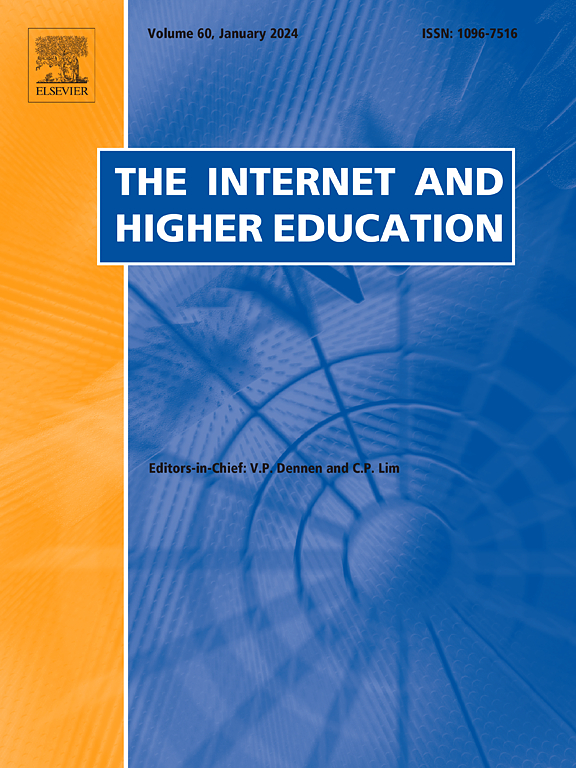授权ChatGPT在高等教育中的应用:利用自我决定和技术-绩效链理论对大学生采用人工智能的意向进行综合分析
IF 6.8
1区 教育学
Q1 EDUCATION & EDUCATIONAL RESEARCH
引用次数: 0
摘要
人工智能(AI),特别是ChatGPT,在高等教育中的整合正在迅速扩大,为增强学习体验提供了新的途径。尽管有潜力,ChatGPT的采用仍需要进一步研究,特别是在沙特阿拉伯等地区。以前的研究主要集中在通用的电子学习工具上,但需要更多的研究来研究影响大学生采用人工智能技术的具体因素。本研究旨在调查沙特阿拉伯大学生对ChatGPT的采用情况,重点研究技术-绩效链(TPC)理论在自我决定理论(SDT)结构(自主性、胜任力和相关性)与学生采用ChatGPT意愿之间的中介作用。它还试图确定哪些SDT因素对采用过程影响最大。本研究采用定量方法,收集了沙特阿拉伯253名大学生的数据。采用结构方程模型对收集到的数据进行分析,确定自决理论(SDT)、技术-绩效链理论(TPC)与ChatGPT采用之间的关系。研究发现,感知到的自主性和相关性显著影响TTF和ChatGPT的利用,而感知到的能力没有影响。此外,TTF和使用率是采用ChatGPT意向的主要预测因素。这些发现对教育政策制定者和研究人员来说是有用的,因为它们表明,为了提高大学生对人工智能技术的采用,应该关注他们的心理需求。结果还表明,提高学生的自我决定和他们与技术的感知联系可以显著影响他们采用这些技术的决定。本研究还提出了一种新的模式,其中SDT与TPC在高等教育中的人工智能相结合,特别是在沙特阿拉伯的背景下。这项工作有助于当前关于人工智能在教育中的文献,强调采用过程的文化特殊性。本文章由计算机程序翻译,如有差异,请以英文原文为准。
Empowering ChatGPT adoption in higher education: A comprehensive analysis of university students' intention to adopt artificial intelligence using self-determination and technology-to-performance chain theories
The integration of artificial intelligence (AI), particularly ChatGPT, in higher education is rapidly expanding, offering new avenues for enhancing the learning experience. Despite its potential, the adoption of ChatGPT remains in need of further study, especially in regions like Saudi Arabia. Previous studies have focused on general e-learning tools, but more research needs to examine the specific factors influencing university students' adoption of AI technologies. This study aims to investigate the adoption of ChatGPT among university students in Saudi Arabia, focusing on the mediating role of Technology-to-Performance Chain (TPC) theory between Self-Determination Theory (SDT) constructs (autonomy, competence, and relatedness) and students' intentions to adopt ChatGPT. It also seeks to identify which SDT factors most significantly affect the adoption process. Using a quantitative approach, this study collected data from 253 university students in Saudi Arabia. Structural equation modelling was used to analyze the collected data and determine the relationship between self-determination theory (SDT), technology-to-performance chain theory (TPC) and ChatGPT adoption. Findings reveal that the perceived autonomy and relatedness significantly affect TTF and ChatGPT utilisation, whereas perceived competence has no effect. In addition, TTF and utilisation are the main predictors of intention to adopt ChatGPT. These findings can be useful for educational policy makers and researchers because they indicate that to enhance university students' adoption of AI technologies, focus should be given to their psychological needs. The results also show that enhancing students' self-determination and their perceived connection with technology can significantly affect their decision to adopt such technologies. This research also presents a new model wherein SDT is integrated with TPC with regard to AI in higher education, specifically in the context of Saudi Arabia. This work contributes to the current literature on AI in education with emphasis on cultural specificities of adoption processes.
求助全文
通过发布文献求助,成功后即可免费获取论文全文。
去求助
来源期刊

Internet and Higher Education
EDUCATION & EDUCATIONAL RESEARCH-
CiteScore
19.30
自引率
4.70%
发文量
30
审稿时长
40 days
期刊介绍:
The Internet and Higher Education is a quarterly peer-reviewed journal focused on contemporary issues and future trends in online learning, teaching, and administration within post-secondary education. It welcomes contributions from diverse academic disciplines worldwide and provides a platform for theory papers, research studies, critical essays, editorials, reviews, case studies, and social commentary.
 求助内容:
求助内容: 应助结果提醒方式:
应助结果提醒方式:


